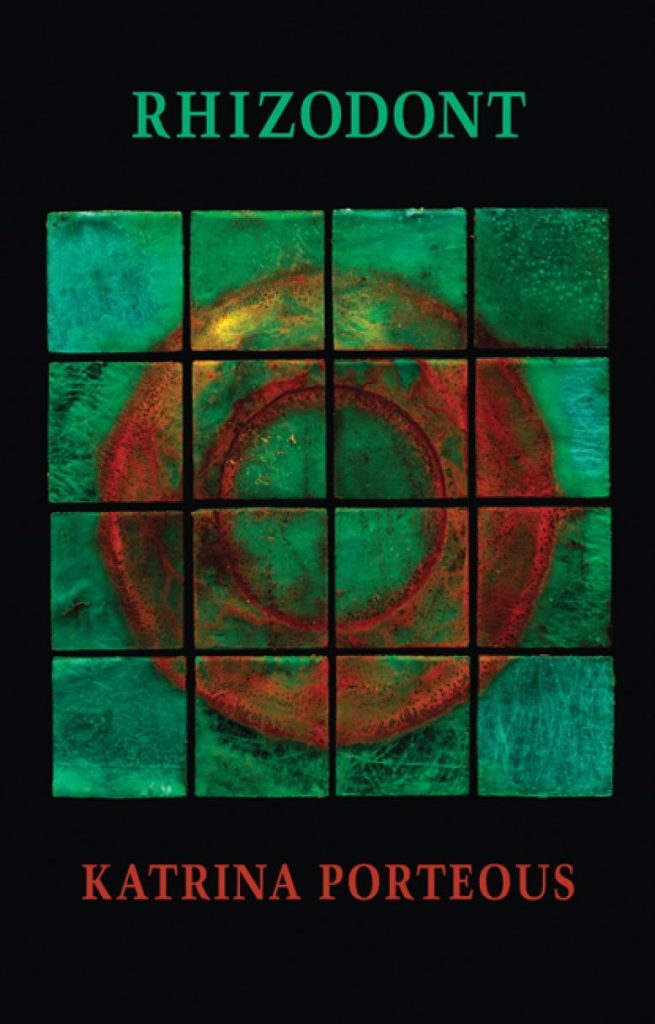Rhizodont
Katrina Porteous
(Bloodaxe, 2024); pbk, £12.99
A poetry collection, if it is to be successful, should offer the reader a ‘way in’, regardless of its tone, form or subject matter. Sometimes, the latter is the biggest obstacle; poets often write of places and experiences that are personal to them, or share insights relating to often complex or esoteric disciplines.
Katrina Porteous’s collection Rhizodont does not initially seem to advertise its own ‘way in. The collection is split into two ‘books’ examining two broad topics: firstly ‘Carboniferous’, a psychogeography of the Northumberland coastline, and secondly ‘Invisible Everywhere’, containing two sequences of poems dealing with contemporary shifts in the use of new technology, and the hard science underpinning the changing climate and landscape of the planet. Maybe a grounding in geology, palaeontology and cybernetic science would therefore be advantageous to readers of Rhizodont. How, then, does the poet offer a ‘way in’ to poems on such demanding themes? The answer is to bring the reader as far as possible into these worlds – something that Porteous does with great sensitivity, erudition and flair.
The title poem shifts wildly between palaeontological detail and bright realist language;
The rhizodont,
Dragging itself out of water
The old world sinks and slips
Beneath its tilted strata.
We’re all on a journey.
This one’s about us
Unearthing ourselves from a place
Elsewhere, the author deploys opening sentences to initiate a ‘way in’ to specific poems.
You’ve come here to ‘get away from it all’; meaning what, exactly?
To lose yourself in this place
and
If there is a heaven it is here, now, off Beadnell Point,
This road of light.
Particularly eye-catching is ‘Kittycouldhavebeen’, a poem that feels a little at odds with the main body of the collection with its portrait of a North-Eastern glamour girl;
Smart as a sherbet dip, as the dangerous lipstick
She practised her signature with
and
Pretty hair plaited, dressed to the keel,
Not cornered by circumstance and sex.
The rhizodont of the title is a predatory fish that became extinct during the Carboniferous period. It provides the poet with a device that links prehistory with the present, one of the underlying themes of this challenging collection. It also connects the two halves of the book – fossil remains of the rhizodont have been found in the Northumberland area, prompting scientific discussion on the nature of climate change which drives some species to extinction – potentially ours.
The second book ‘Invisible Everywhere’ was partly written in collaboration with scientists. It deals with themes of intelligence; human, yes, but mainly artificial intelligence, cybernetics and the autonomy of machines. In the poem ‘The Website at the End of the World’ the author recognises the ubiquity of the digital world in our human lives. It pithily examines the author’s digital footprint;
My wandering snail-trail of websites, my cookies, my clickbait
[…]
My status updates, my step-count, my heart-rate, my Fitbit
concluding with a darkly witty pay-off,
Your phone wants to guess the end of this poem
Based on the premise that you demand more of the same.
As this collection unfolds over 150 pages it becomes clear that Porteous is engaged in something much more ambitious than an extended coastal walk and discussions on some aspects of modern science. The final sequence of thirteen poems recognises that although much of our digital existence is encypted, that existence resembles an iceberg whose bulk is below the surface of the visible world. The last poems visit places that we cannot go – the interior of glaciers, the micro-spaces between layers of unexposed sedimental rock. Porteous shrewdly explores the paradox that humankind faces: that these inaccessible places might offer answers to our ecological problems, but that attempting to expose them serves only to disrupt the balance of nature even further.
By the time the final poem arrives, the poet’s scope has broadened as the camera pulls out to view Earth from a distance. The closing image is infused with melancholic inevitability. Cycles of global warming and cooling may be natural, but our current period of warming is more acute, final, a feeling unequivocally borne out by science;
Ice, ubiquitous
In the Universe, a permanent presence,
What are you doing, so close to the Sun?
Recycling,
I have forgotten its name, a planet in space.
Andy Jackson


Leave a Reply